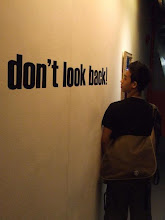Climber XXX was a very performance and goal orientated individual. He believed that the scheduled team training was insufficient for him to excel. He drafted up his own training programme (which was okay as long as he joins everyone for training) and attended scheduled training as and when he wanted. Personally, I felt that his individualistic attitude was not very appropriate as a varsity player and I saw a need to talk to him regarding this issue. And so, there was this night where I managed to catch him online via MSN (which I regretted doing so). My intention was to have a casual chat to understand his stand, to state my opinion and perhaps seek a compromise. However, the conversation turned ugly, with both of us rebuting each other. Phrases such as " Whatever, I don't really care" and "why are you so selfish?" were typed out in CAPS. Eventually, he quit the conversation, saying he was busy. There wasn't much room for negotiation in the conversation and we didn't manage to come to a compromise. He left for SEP the following semester and we never got to resolve our conflict.
The good thing is boys being boys, both of us forgave and forgot about the incident when he returned from SEP. Hence there is no hard feelings between us now.
I believe that the main problem lies within the serious difference in opinions with regards to being part of a team, which led to a lose-lose situation. During the conversation, I must admit that I got rather frustrated and impatient with my team mate's comments. Perhaps my responses to him were too emotionally driven and not judgemental enough. Putting myself in his shoes, I believe he could be feeling the same way as well, irritated by me finding faults at him. Yet , perhaps at the same time he couldn't really be bothered with what I was trying to put across to him.
I am not really certain what truly led to that dead lock situation.
Could it have been..
- the wrong choice of communication channel?
- the wrong timing of the conversation? (it could have a been a tiring day for either one of us?)
- both of us were too headstrong? Refusing to give in as it might be a man's "EGO" issue.
- both of us were too emotionally driven by our own beliefs and not behaving rationally?
- Or was it the tone that we confronted each other with?
Could addressing the above issues, allow us to resolve the conflict amicably?
On a lighter note, the rest of my team continued to train hard and we eventually emerged champion in a National bouldering championship during that semester!
Here's a photo of my team! Can you spot Matthew and me?




